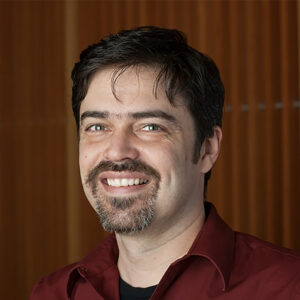Congratulations to our eighth annual Net Zero Fellows: Chris Flint Chatto of ZGF Architects and Maggie Harris of Holst Architecture.
Visit our On-demand Training page to watch the presentation recordings.
Congratulations to our eighth annual Net Zero Fellows: Chris Flint Chatto of ZGF Architects and Maggie Harris of Holst Architecture.
Visit our On-demand Training page to watch the presentation recordings.
Chris’ research will explore net-zero energy design in medical office buildings. With its demanding program and complex regulations, healthcare is seen as one of the most challenging typologies to achieve net zero energy. Healthcare is also a sector where building owners have been slower to adopt energy efficiency, but recent developments including the HHS Health Sector Climate Pledge have intensified the focus on operational efficiency, with over 100 signatories including many Pacific Northwest leaders.
The net-zero medical office building prototype can showcase how these institutions can grow their services without expanding their overall greenhouse gas emissions. The research goals are to:

Chris Flint Chatto, AIA, LFA, LEED AP BD+C
Principal, ZGF Architects
Chris has focused his career on integrating architectural design and high-performance building systems, specializing in energy use and environmental studies. He is responsible for researching and facilitating the design of efficient and healthy buildings through the innovative use of materials, technology, and design techniques. Under his guidance, Chris’ clients have pursued cost-effective, sustainable solutions that are at a higher level than they thought possible. His projects have achieved full Living Building Challenge certification, LEED Platinum certification, and net zero energy, carbon, and water.
Chris has developed and taught courses focusing on sustainable, climate responsive, and energy efficient design at the University of Washington and the University of Oregon; was founding chair of the Seattle Emerging Green Builders; and is active on educational and advocacy issues for both the Seattle and Portland AIA Committee on the Environment (COTE). The results of his work have been presented at numerous conferences, lectures, and seminars throughout the country including Labs21, Tradeline, Living Future Conference, and the AIA + 2030 Professional Series.
View Presentation: Coming Fall 2025
Download Research >> Coming Fall 2025
Maggie will develop a new approach for Post Occupancy Evaluations in multifamily buildings that explores the relationship between performance and resident perceptions. Housing is widely understood as a social determinant of health, and housing conditions affect multiple dimensions of residents’ well-being. However, first-hand resident feedback is seldom collected during the design and development process. Understanding the resident-centered perspective is a critical tool that can link the intended building experience with the lived building experience in affordable housing projects.
The study will examine the relationship between the objective conditions (building performance) and the subjective conditions (resident perceptions) of affordable housing projects. This will be done through a pilot study at a permanent housing program site in Portland, Oregon.

Maggie Harris
Senior Associate, Holst Architecture
Maggie Harris is a lifelong Oregonian who currently resides in Portland. She graduated with a degree in Journalism and Communication from the University of Oregon, and earned a Master of Architecture, as well as a Graduate Certificate in Sustainable Real Estate Development, from Tulane University. As a Project Manager at Holst Architecture and a Ph.D. student at Portland State University’s School of Urban Studies, she is entrenched in both housing design and research. Her research focuses on the intersections between housing and health, examining the impact of housing on the mental health and wellbeing of low-income populations.
During her career, she has managed a range of housing projects throughout the country, including permanent supportive, affordable, market-rate, and student housing. Working across a range of geographies and project scales has helped Maggie understand the importance of distinct housing solutions tailored for specific population sets. In September 2024, Maggie joined the Oregon Housing Stability Council, which reviews and sets policy for the development and financing of affordable housing in Oregon. Maggie is also a mother of a busy toddler and passionate that he grows up understanding that housing is a human right, reflected by the community in which we live.
View Presentation: Coming Spring 2026
Download Research >> Coming Spring 2026
Learn more about last year’s Net Zero Fellows.
To assist in selecting the grant recipient, Energy Trust assembled a Net Zero Advisory Panel comprised of leaders in a variety of commercial new construction industry sectors.
| J’reyesha (Jay) Brannon NSBE Pro PDX and City of Portland | Andrea Caudill Port of Portland | Erica Dunn Opsis Architects |
| Gaetan-Dauphin Nzowo NSBE /David Evans | Ihab Elzeyadi University of Oregon | Jeni Hall Energy Trust |
| Joel Good RWDI | Karen Rugg Perennial Building | Lindsey Kahler SERA Architects |
| Ralph DiNola Formerly New Buildings Institute | Sam Rosenberg Pacific Northwest National Laboratory | Shelly Carlton Energy Trust |
| Michelle Montiel Green Hammer |